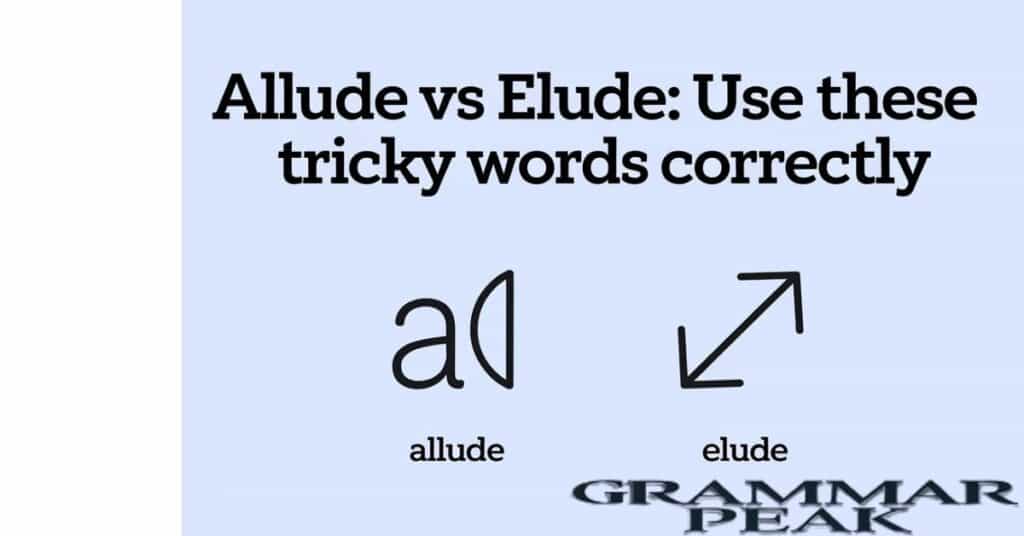Understanding the difference between allude and elude can be challenging. Many people mix these two words up in their writing and conversation. This article will clarify the meaning of allude and the meaning of elude.
You will learn the differences between these words, their origins, and how to use them correctly. We will provide examples of allude and examples of elude to help you avoid confusion. By the end, you will have a clear understanding of these tricky words.
What Does “Allude” Mean?
The word allude means to make an indirect reference to something. When you allude to something, you are hinting or suggesting it without stating it directly. This is often done in writing or conversation to give a subtle hint or to create a deeper meaning.
For instance, if someone says, “He is a real Romeo,” they are alluding to Shakespeare’s character to suggest that the person is romantic. The usage of allude is common in literature, speeches, and everyday conversation. It allows the speaker or writer to convey ideas without explicitly stating them. This can add a layer of sophistication to your writing.
You Might Allude vs Elude: How to Use These Tricky Words Correctly
What Does “Elude” Mean?
On the other hand, elude means to escape or avoid something. This could be a physical escape or the act of avoiding a topic in conversation. For example, if you say, “The criminal managed to elude the police,” it means that the person successfully escaped capture.
Additionally, elude can also refer to something difficult to grasp or understand. For instance, if someone says, “The answer eludes me,” it means they cannot comprehend or find the answer. This word is often used in contexts involving evasion or escape, whether literally or figuratively.
“Allude” vs “Elude”: The Differences
The difference between allude and elude lies in their meanings and usage.
Allude is about making a subtle mention or indirect reference. It is often used to enrich conversations or texts with depth.
In contrast, elude focuses on avoidance or escape. It relates to evading something or not being easily understood.
To help clarify the difference, consider this table:
| Aspect | Allude | Elude |
| Meaning | To make an indirect reference to something. | To evade or escape something. |
| Usage | Mention something subtly without explicitly stating it. | Avoid being caught, understood, or remembered. |
| Context | Used in literature, speeches, and conversations to hint at a subject. | Used to describe physical escape or difficulty in understanding. |
| Examples | “She alluded to her favorite book.” | “The thief eluded the police.” |
| Core Idea | Indirect reference. | Avoidance or escape. |
Read Mist Be Allude vs Elude: How to Use These Tricky Words Correctly
Origins of “Allude” and “Elude”
Both words have their roots in Latin, which helps explain their meanings.
Origins of “Allude”
The word allude has been used in English since the 14th century. It was originally used in literary contexts to indicate a reference to another work or an event. The subtlety in language allows writers to convey complex ideas without being too direct.
This can be especially useful in poetry, where imagery and suggestion are key components. In modern usage, allude is still prevalent in literature, speeches, and everyday language. Writers often use allude to connect their ideas to a wider context, making them more relatable and engaging for the reader.
Origins of “Elude”
The word “elude” has its roots in the Latin term “eludere,” which means “to evade” or “to escape.” This Latin origin highlights its primary meaning: the act of escaping or avoiding something. Over time, the term has evolved in English to describe situations where someone successfully avoids capture or does not grasp a concept.
For example, you might say that an idea eludes you if it remains difficult to understand. In contemporary usage, “elude” often refers to both physical escape and the metaphorical evasion of understanding. It captures a sense of cleverness or agility in avoiding something unwanted.
Examples of “Allude” and “Elude” Used in Sentences
Understanding the correct usage of allude and elude is essential for effective communication. Let’s look at some examples of these words used in sentences.
Examples of “Allude”
- In his speech, the author alluded to classic literature to emphasize his point about human nature.
- The song lyrics allude to a famous historical event, creating a deeper connection for the listeners.
- During the meeting, she alluded to potential changes in the company’s policy without elaborating further.
- The film subtly alludes to the struggles of the protagonist’s childhood through visual storytelling.
- His comment alluded to a shared joke from their college days, bringing smiles to everyone’s faces.
- The painting alludes to themes of freedom and liberation, inviting viewers to interpret its meaning.
- In her blog post, she alluded to recent scientific discoveries that could change public perception.
- The novel alludes to cultural traditions, enriching the narrative with layers of meaning.
- The professor alluded to various theories in her lecture, encouraging students to explore them further.
- By mentioning the weather, he alluded to the mood of the gathering without directly stating it.
Examples of “Elude”
- The thief was able to elude capture by slipping into a crowded marketplace.
- Despite their best efforts, the details of the plan continued to elude the detective.
- She tried to elude the questions about her personal life by changing the subject quickly.
- The elusive butterfly managed to elude the photographer’s lens, darting away just in time.
- Many students find that understanding complex math concepts can elude them during exams.
- The cat skillfully eluded the dog, darting under the fence before it could catch up.
- During the chase, the suspect managed to elude the police by hiding in a nearby alley.
- For years, the secret to the ancient puzzle seemed to elude historians and scholars alike.
- He attempted to elude responsibility for the mistake by blaming his team members.
- The meaning of the abstract painting seemed to elude the viewers, sparking debate among them.
Synonyms of “Allude” and “Elude”
Expanding your vocabulary can help you communicate more effectively. Here are some synonyms for allude and elude.
Synonyms of “Allude”
- Refer
- Suggest
- Imply
- Indicate
- Mention
- Insinuate
- Intimate
- Signal
- Evoke
- Allusion
- Point to
- Touch upon
Synonyms of “Elude”
- Escape
- Avoid
- Evade
- Eliminate
- Bypass
- Dismiss
- Shun
- Dodge
- Foil
- Slip away
- Flee
- Outwit
FAQ” S
What does “allude” mean?
It means to indirectly reference or hint at something.
What does “elude” mean?
It means to evade or escape from something or someone.
Are “allude” and “elude” interchangeable?
No, they have different meanings and are used in different contexts.
Can “allude” be used in casual conversation?
Yes, it’s commonly used to suggest ideas or references informally.
Is “elude” used more in physical contexts?
Yes, it often describes escaping or avoiding capture or understanding.
Conclusion
In conclusion, allude and elude are two distinct words that are often confused in the English language. Allude refers to an indirect or subtle reference, while elude means to evade or escape something. By understanding the differences between these words and their proper usage, you can improve your communication skills and avoid common mistakes. Remember, the key to mastering these tricky words is to practice using them in context. Pay attention to how they are used in your daily reading and writing, and try to incorporate them into your language. With time and practice, you’ll be able to use allude and elude with confidence.

Mason Blake is an experienced blogger with a passion for language and communication. With years of expertise in crafting informative and engaging content, Mason shares valuable insights on grammar and writing. His clear, concise, and reader-friendly approach has earned him a loyal following, helping readers sharpen their language skills and master the art of effective communication.








Dive into the stunning universe of EVE Online. Forge your empire today. Create alongside thousands of players worldwide. Play for free